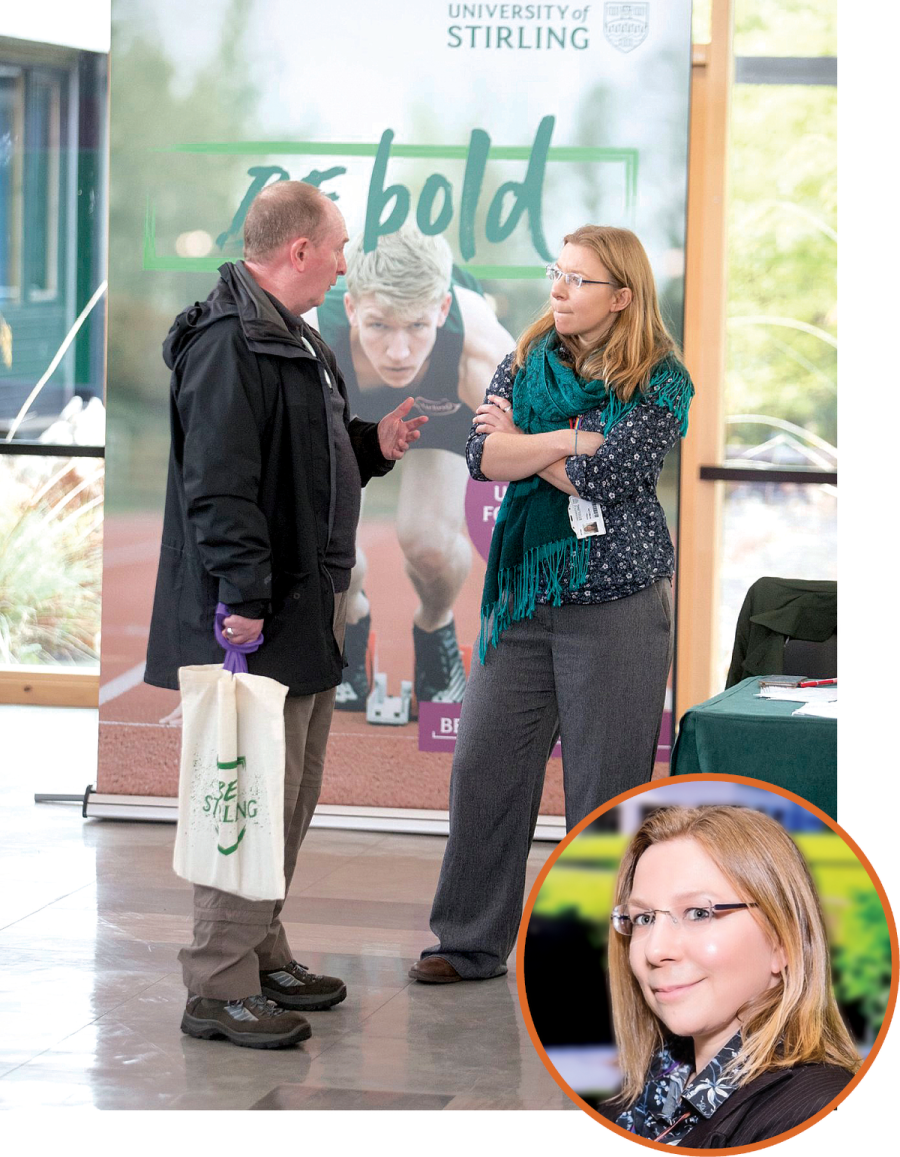Member Profile: Fiona McMillan
Working as an academic bookseller for many years gave Fiona McMillan a chance to understand academics. In 2019, she transitioned to alumni relations and eventually business development at her alma mater, the University of Stirling in Scotland, forging connections across the university. Here, she shares more about her career journey, collaborating with colleagues, launching an initiative to support student mental health, and more.

Fiona McMillan
Business Engagement Officer
University of Stirling
How did you find your way to the University of Stirling?
I'm a Stirling alumna myself. I did history and politics, and absolutely loved it. I never envisaged myself actually coming back and working for the university. I worked in academic bookselling for years, which I loved, before moving on to explore new things. I found I really missed working with students and the energy and excitement that comes with working in an academically adjacent role. When I noticed that Stirling was looking for a new colleague in a study abroad position, I took that role, much to my delight, and really enjoyed it! It’s a real pleasure to be part of the university again.
Working on programs so closely aligned to students really sparked my interest in employability. Eventually there was an opportunity to work with our alumni relations team, where I started working in 2019. I have very recently moved into a new role in business engagement, and I’m using a lot of the skills developed in advancement in new ways.
What’s one thing you enjoy about your work?
I'm lucky to work really closely with fantastic colleagues. They’re a pleasure to work with. And we are really integrated across the university. In advancement, I was part of a small team, which means we do a lot with a little—but that also brings some really exciting opportunities. You're able to get involved in a lot of things and your voice is heard.
What’s one professional project you’re proud of?
My first really exciting success actually came about from attending my first CASE conference, the CASE Europe Annual Conference in 2019. When I was at CEAC, one of the topics that really struck me was student mental health. I'd already been thinking about how to address the mental health and well-being challenges graduates were facing. I was at that point a newcomer to advancement, so when I came back from the conference, I got really excited to launch this new idea.
The programme we created was called Life Beyond Stirling. For it, I worked with colleagues from Stirling’s Accessibility and Inclusion team, our Career and Employability Service, and a student intern (to capture the voice of a graduating student). For Life Beyond Stirling, we arranged sessions for students on personal finance, buying a house, resilience during job transitions, etc. We also planned an alumni panel involving LGBTQ+ graduates sharing their experiences of being out in the workplace.
This is all pre-COVID. I’m grateful that we did this then, because when things got really tough for our graduates [during the pandemic], we had a whole bunch of resources from Life After Stirling that we could share and implement.
Before coming to the University of Stirling, you were an academic bookseller. What skills from past jobs have you brought to your work here?
I learned so much from it. From the student perspective to working adjacently to a university, it was a really nice way to understand the culture, the personalities, and the academics, and see them from a different perspective.
Fundamental, too, are the people skills that I've developed over all of my different roles. In any sort of customer service role, you're going to develop people skills, and my 13 years in retail definitely helped that massively. But I also worked in bereavement for a while, which meant that I was able to support people through some really difficult conversations. That's been an invaluable skill in developing empathy for students, early-career graduates, alumni—anyone who's in a slightly vulnerable place and needs a little bit of support. We’re here to help people at Stirling. We offer lifelong career support and see ourselves very much as a family.
When you first started at the university, what helped you navigate being a newcomer to advancement?
There have been a number of resources, like that first CASE conference I attended. I made some incredible friends and connections there, and it helped build my understanding of both my role and where I wanted to go. That was really, really exciting, and helped me find my feet in the in the industry or in the sector. I do have the advantage of learning from and working with some colleagues who are very established within my team. The Scottish and the U.K.-wide alumni networks are such generous and helpful resources.
Additionally, I’m very fortunate with the relationships I have with colleagues in the wider parts of the university. Understanding or learning what they want from us, and how we can support them is really useful. Building those relationships and servicing the university as a whole is a nice, two-way process. I might have a small team, but I actually feel part of a much wider team.

New Routes
About the author(s)
Meredith Barnett is the Managing Editor at CASE.